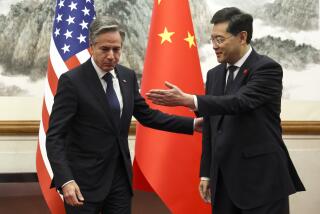Chinese Party Ousts Pro-Liberal Chief of Propaganda
- Share via
BEIJING — The Chinese Communist Party said Tuesday that it has fired its propaganda chief, who was one of the leaders of a short-lived effort at political liberalization in China last year.
A spokesman for the party’s International Liaison Department said that Zhu Houze has been reassigned and that the new head of the party’s powerful Propaganda Department will be Wang Renzhi, formerly the deputy editor of the party theoretical journal Red Flag.
The personnel change brings Chinese television, movies, newspapers and other propaganda outlets under the direct control of the conservative wing of the party leadership. It is a reflection of the dramatic political change in China over the last month accompanying the ouster of Communist Party leader Hu Yaobang.
Although the party did not announce the change until Tuesday, Zhu reportedly stopped work several weeks ago, after the party leadership launched its campaign against “bourgeois liberalization.”
Tightening Being Felt
The impact of the party’s renewed insistence on tight control over propaganda is already being felt. Newspapers and television news shows have become far more cautious. Chinese sources say that several movies completed last year have been held back from public release.
One is China’s first surrealistic film, “A Death Call on People Alive.” Another is a major new movie on the reasons for the Cultural Revolution made by one of China’s leading film directors, Xie Jin.
“This is the standard way of doing things here,” said one source. “First you go after the people in charge, and then you go after the things they did.”
Other important personnel changes may be announced over the next few weeks, according to Chinese sources. They say that Wang Meng, a leading Chinese writer who was appointed minister of culture last year as part of the party’s campaign to show its support for intellectual freedom, is also being replaced.
Held Post 18 Months
Zhu, 56, the former Communist Party boss in the southern province of Guizhou, had assumed control of the Propaganda Department only 18 months ago. His predecessor, Deng Liqun, was a conservative ideologue and one of the principal architects of the 1983 “spiritual pollution” campaign against Western influences.
Last spring, Zhu suddenly emerged as one of the most outspoken proponents of political change and an easing of Communist Party controls.
“Can we be a bit more generous as regards those comrades who hold different views?” he asked in the party newspaper People’s Daily last summer. “Can we make the whole atmosphere and environment a bit more relaxed and flexible? . . . On this issue, we can get better.”
Zhu also advocated a more tolerant approach to outside influences.
“We have adopted Marxism as the party’s guiding principle, but Marxism did not originate in China,” he wrote. “This is why I never insist on passing judgment on anything just because it is Chinese, foreign, Eastern or Western.”
More to Read
Sign up for Essential California
The most important California stories and recommendations in your inbox every morning.
You may occasionally receive promotional content from the Los Angeles Times.










